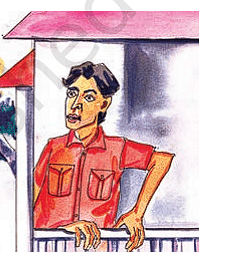Summary: एक तिनका | Hindi (Vasant II) Class 7 (Old NCERT) PDF Download
| Table of contents |

|
| पाठ प्रवेश |

|
| पाठ का सार |

|
| आशय |

|
| कठिन शब्दों के अर्थ |

|
पाठ प्रवेश
कविता "एक तिनका" एक उपद्रवी या अटल व्यक्ति के अंतिम उत्तर के बारे में है। इसमें एक व्यक्ति जो घमंड में भरा हुआ है, अचानक एक तिनका उसकी आँख में चढ़ जाता है। इससे वह परेशान हो जाता है, और तिनके को हटाने की कोशिश करता है, लेकिन तिनका उसके बजाय उसके साथ ही बच्चे के आँख में चला जाता है। इससे उसकी सोच में बदलाव आता है और वह अपने घमंड की परीक्षा लेने के लिए सामान्यता की ओर मुड़ता है।

पाठ का सार
कविता की सारांश में, एक व्यक्ति के घमंड को तिनके के रूप में प्रस्तुत किया गया है, जो उसके सोचने और व्यवहार को बदल देता है। उसका अहंकार उसे आजादी और अधिकार का अहसास कराता है, लेकिन तिनके के आँख में गिरने से वह अपने असली स्वरूप को पहचानता है और अपने बेहतर आत्म-समझ की ओर ध्यान देता है।
आशय के रूप में, कविता एक अधिकारी या उत्तमता के अहंकार को उजागर करती है और सामान्यता और सहानुभूति की महत्ता को बताती है। यह एक पाठ है कि अगर हम अपने आप को संतुष्ट और विनम्र बनाए रखें, तो हमारी जिंदगी में अधिक संतुष्टि और सहानुभूति होगी।

आशय
इस कविता में व्यक्त किया गया आदमी और तिनके की कहानी एक महत्वपूर्ण संदेश प्रस्तुत करती है कि अगर हम अहंकार में डूबे रहते हैं, तो हम कभी-कभी अपने आसली गुणों और सहानुभूति की महत्ता को नहीं समझते हैं। इसे तब तक जीवन नहीं समझा जाता है, जब तक कि हमारे सामने कुछ तोड़े नहीं जाते।
कठिन शब्दों के अर्थ
1. ऐंठा - अकड़ा
2. मुंडेरे - छत का किनारा
3. तिनका - सूखी घास का टुकड़ा
4. बेचैन परेशान
5. दुखना - दर्द होना
6. मुँठ - मोड़कर गोल किया हुआ कपड़ा
7. दबे पाँव भागना - चुपके से निकल जाना
8. ढब- उपाय
|
17 videos|219 docs|30 tests
|
FAQs on Summary: एक तिनका - Hindi (Vasant II) Class 7 (Old NCERT)
| 1. What is the significance of the title "एक तिनका Class 7" ? |  |
| 2. How can Class 7 students benefit from reading the article? |  |
| 3. What are some key themes discussed in the article "एक तिनका Class 7" ? |  |
| 4. How can parents support their Class 7 children based on the information provided in the article? |  |
| 5. What are some practical tips mentioned in the article for Class 7 students to excel academically? |  |
















